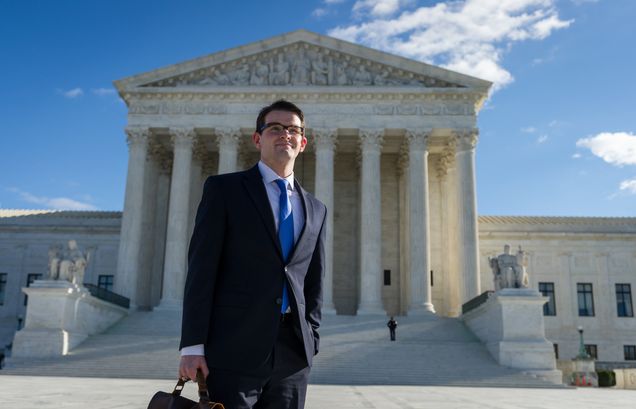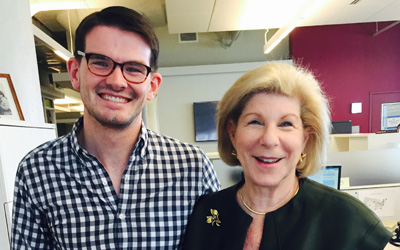Gavel-to-Gavel Guidance in Washington, DC
Sean McCauley (’17) gains field experience through his Semester-in-Practice with NPR’s legal affairs correspondent Nina Totenberg.
 As a legal affairs intern for National Public Radio, Sean McCauley (’17) closely tracks the progression of cases as they ascend in the appeals process, extracting the threads of legal precedents that inform the Supreme Court’s landmark decisions.
As a legal affairs intern for National Public Radio, Sean McCauley (’17) closely tracks the progression of cases as they ascend in the appeals process, extracting the threads of legal precedents that inform the Supreme Court’s landmark decisions.
McCauley has known since the eighth grade that he wanted to pursue law. “Every step after that,” he says, “has been a natural progression toward that dream.” After completing a dual major in English and History at the Virginia Military Institute, he worked as a defense investigator for the Georgetown University Law Center. He chose BU Law because he knew the School “has really good practice programs in place.” He had not planned to pursue a Semester-in-Practice (SIP) until he discovered the open position at NPR, instead focusing initially on the clinical programs at BU Law. He will get to experience both tracks of practical learning, however, after completing the SIP in the fall and the Criminal Law Clinic this spring.
In his current role, McCauley helps to parse the Court’s arguments, holdings, and dissents, considering a confluence of critical factors. With Nina Totenberg as his mentor, he reviews Writs of Certiorari, amicus briefs, and other documents in order to understand why some cases capture the attention of the Court in favor of others. He also has the opportunity to discuss broader concepts of the law with attorneys and justices in order to gain deeper insight. McCauley has learned from Totenberg how the abstract law becomes grounded in reality. “Nina has mastered the formula of taking the law and making it accessible,” he says. “She has more than earned her reputation of being the best at what she does in the country: distilling information and getting leads to inform the public what’s going on in the world.”

McCauley focuses on placing the cases in a broader historical and political context: “The issues and facts that bring cases before the Supreme Court are not necessarily the issues and facts as they will develop in the oral argument,” he says. “When you present an argument before the Supreme Court—or any court—you have to target your argument toward who you think you can sway. It’s not necessarily about the issue that goes before the court. A case of first impression almost never happens in the Supreme Court so it’s important to look into the history of the law and precedents. The justices bring secondary and tertiary issues to the case, so there’s a lot to consider.”
McCauley credits his Civil Procedure class, taught by Professor Kristin Collins, with solidifying the foundational skills on which he has relied over the past semester. Specifically, he says, “The process of how to get a case to be heard on appeal is wildly important and not intuitive to someone without a legal education.” McCauley adds, “The writing classes I’ve taken have helped immensely with analysis and understanding how to argue both sides.”
Building on the knowledge he gleaned over the summer while working for the Mid-Atlantic Innocence Project, an organization that works to overturn wrongful convictions, McCauley’s time in DC has reaffirmed his decision to pursue criminal law. In the meantime, he is looking forward to returning to BU Law in the spring. “In a weird way,” he says, “I do miss the classroom. But I love working here, and would encourage everyone to do it—it’s a different kind of learning experience—nobody is there to lecture you, so have to figure everything out yourself.”
Reported by Patricia Broe (CAS’16)